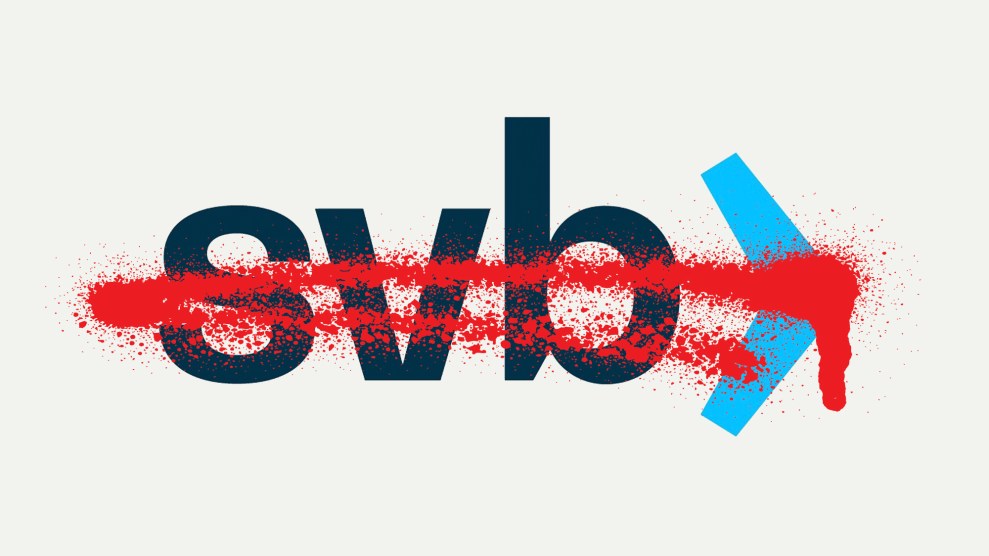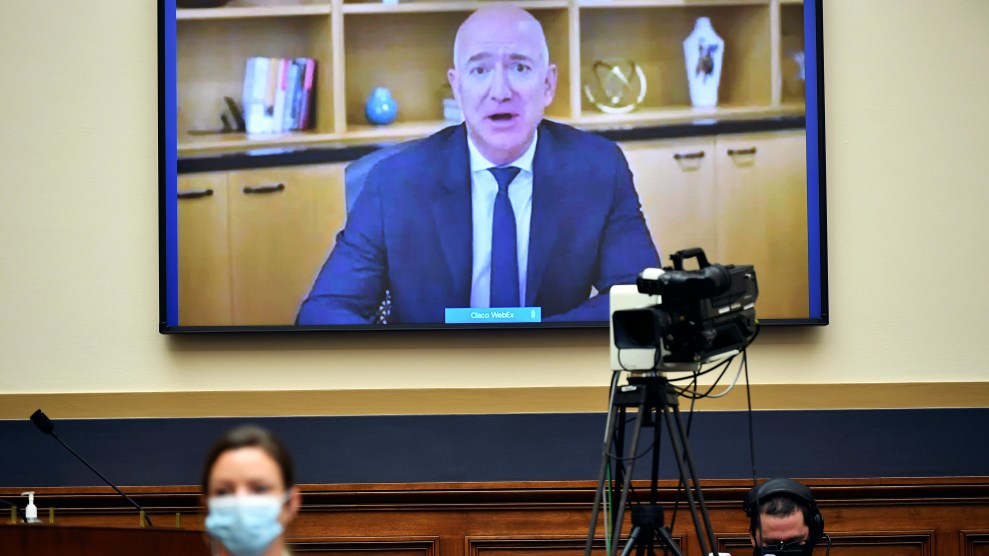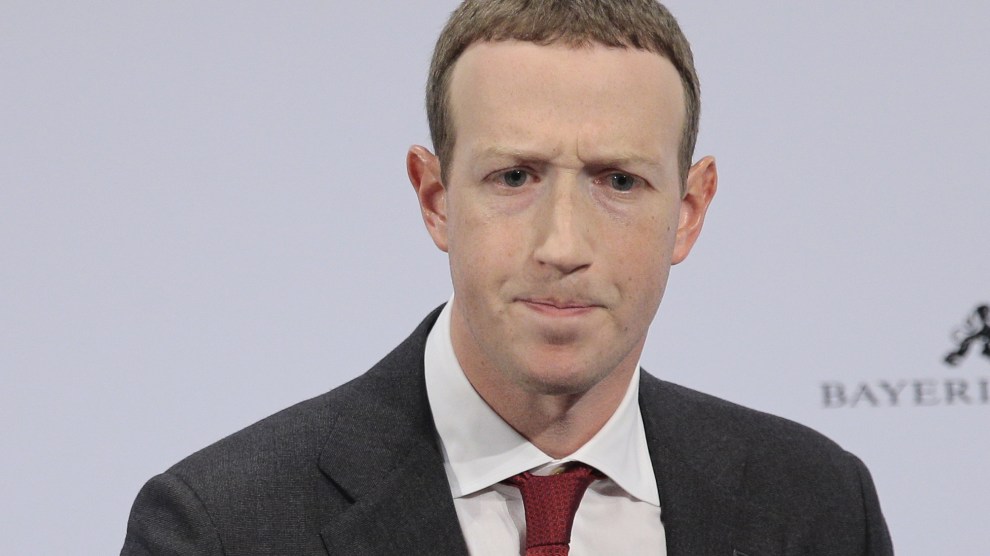
Mother Jones; Getty
During the Silicon Valley Bank collapse, people in tech started to realize something: a lot of people really don’t like them.
Since the bank started to buckle late last week, tech luminaries have taken time out of their busy schedules of doing innovation to tweet about how everyone rooting against a bailout of Silicon Valley Bank simply doesn’t get it. Silicon Valley had birthed “the greatest wealth generation engine this country has had for the last 2 decades,” said Austin Federa, a spokesperson for the crypto blockchain Solana, and a bailout was essential to save a cornerstone of the American economy.
While getting ratioed in their own tweet threads, the wizards of tech seethed that so many didn’t see what they could. “The events of this weekend change things. The bank run isn’t actually the biggest thing—the reaction to it is,” tweeted Flo Crivello, a former Uber product manager who is now CEO of a remote work tool company. “It’s making me and a lot of people realize that the media’s coordinated anti-tech campaign over the last 6yrs has been a lot more effective than we thought.”
Helen Min, a co-founder of a tech venture capital firm tweeted a less conspiratorial version of the same diagnosis: “VCs [are] now realizing Silicon Valley has a public image problem.” Indeed, prominent venture capitalist David Sacks, astutely noted that many were resistant to bailing out Silicon Valley Bank because it “has the name Silicon Valley in it.” If the situation were a little bit different, Sacks posited during an interview with UnHerd, people would get it; say, Sacks argued, “this was a farmers’ bank and it was 40,000 farms, small business farms that were on the hook, everybody would understand.”
Without realizing it, Sacks crystalized people’s real beef with Silicon Valley: if people felt like Silicon Valley actually improved or sustained their lives, they would defend it. More people would be up in arms about a bank for farmers collapsing because farmers make food that they like and literally need to survive. The region that once produced microprocessors, personal computers, internet search, and web browsers, kind of doesn’t really do that stuff as much as it used to, and people are noticing.
For several years, public opinion has grown increasingly critical of tech companies. In 2015, a Pew poll found 71 percent of the country had a positive view on tech, and 17 a negative one. A 2019 follow-up found only 50 percent had a positive view, with 33 percent having a negative one. A Gallup poll from 2020 put positive views of tech companies at just 46 percent and found that 57 percent of US respondents wanted more regulation. In 2022, Morning Consult found 67 percent of respondents favoring regulation, and agreeing tech’s benefits did not outweigh the power the industry had accrued.
It’s worth remembering that the conglomeration of private tech startups, the VCs that fund them, and the mega-corporations who all call themselves Silicon Valley were never as innovative as they liked to claim. In her 2013 book The Entrepreneurial State, Mariana Mazzucato observed that the real source of American innovation has always been the government. Libertarian, anti-establishment Silicon Valley owes its entire existence to the federal government, whose contracts and grants have funded its companies, and whose deep coffers have funded the research and development of technologies that Bay Area companies figured out how to profit from.
Only governments have the massive capital base and the lack of need for profit to be able to fund truly risky innovations that could either go nowhere or be the next big thing, Mazzucato notes. In the book, she sums up this history using Apple’s iPhone: its multitouch sensors, GPS, silicon-based semiconductors, LCD display, lithium ion battery, cellular technology, and micro hard drive—not mention the internet almost every app it runs uses—were all created through significant government research and funding. Steve Jobs’s team may have figured out how to deftly put them together, but the hardest parts had been worked out before he showed up.
But in the stories Silicon Valley tells, it is always some enterprising dropouts in a garage who are the innovative ones—pay no mind to the hundreds of millions of dollars and teams of researchers that preceded the suburban fantasy. It’s almost as if the real innovation was with advertising and mythmaking.
To be fair, there is value in figuring out how to apply technology, but that feels rarer all the time. So as self-proclaimed innovators rushed to defend the Valley, wits on Twitter were quick to make fun of these entrepreneurs’ inessential products:
GUY WHO INVENTED A SERVICE CALLED "BURGR" THAT USES AI TO MAIL YOU A SUBSCRIPTION BOX OF RECOMMENDED HAMBURGER TOPPINGS ONCE A MONTH AND MAKES MONEY BECAUSE IT'S HARD TO CANCEL: That's real nice how you want to stifle innovation. With your smart phone and your computer microchips
— Patrick Cosmos (@veryimportant) March 13, 2023
It’s hyperbolic, but there’s truth in it. Figuring out inane ways to skim profit off people is the whole game for a lot of tech-enabled venture capital-backed companies. Harry’s Razors didn’t innovate on shaving, but it did figure out a way to lock consumers into a potentially lucrative subscription model. You could buy houseplants at the store or order them from Home Depot before San Fransisco venture capital pumped money into The Sill. Netflix is nice, but it hasn’t made our lives materially better. Genuinely useful services like Uber and Spotify (Swedish, but boosted by the Bay) made using cabs better and listening to music better, but famously did this by funneling money away from armies of cabbies and musicians, into the pockets of software developers, product managers, and, especially, people sitting in Northern California’s C-suites.
If you squint, yes, these products have changed the world—but they haven’t necessarily improved it. At best, they’ve re-sorted and spiffed-up things that already existed, making them more convenient. At worst, they’ve accelerated the process of contracting out worker-made value and contributed in creating an even more precarious gig underclass.
After all, one of Silicon Valley’s biggest innovations was a way to make powerful people feel ethical about avarice. Yes, tech titans, made banker-like money, but unlike bankers, they told themselves, they helped the world.
For a while, their customers believed it. The public response to Silicon Valley Bank’s dissolution shows that fewer and people buy the industry’s Randian delusions of personal enrichment as societal welfare. If the collapse reveals to Silicon Valley that it has a PR problem, that’s because all it ever had was PR.















